How Hall of Fame Teams are Meeting the Challenges of COVID-19
Just like all of the other FIRST teams around the world, FIRST Hall of Fame teams are working to navigate new circumstances to create all new paths and definitions for a successful season. Students and mentors are working with new challenges and restrictions within their partnerships and governmental policies, but they are also creating new opportunities. Here are how some of the Hall of Fame teams are making this FIRST season work!
Team 359
In person meetings with new temperature checks procedures
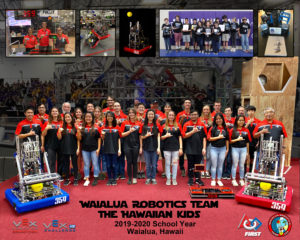 Hawaiian Kids Team 359 from Waialua, Hawaii (2011) has started in-person work days for our program since the start of our 2nd Quarter of School on October 12, 2020. Our team meets twice a week from 2:30pm (afterschool) to 8:00pm. Our program has developed an “acknowledgment” form for parents and students to sign as a requirement for participating in-person. In addition, additional documents are shared with parents and our school leadership team about current regular safety/cleaning procedures.
Hawaiian Kids Team 359 from Waialua, Hawaii (2011) has started in-person work days for our program since the start of our 2nd Quarter of School on October 12, 2020. Our team meets twice a week from 2:30pm (afterschool) to 8:00pm. Our program has developed an “acknowledgment” form for parents and students to sign as a requirement for participating in-person. In addition, additional documents are shared with parents and our school leadership team about current regular safety/cleaning procedures.
Downloads
- Waialua Robotics Program In-person Safety Protocols 2020-21 SY, updated 10-8-20
- Waialua Robotics Temperature Screening Log
We do a daily temperature check of each person who comes into our facility and log it for accountability purposes. These forms do NOT absolve any liability on anyone’s part. The intent is to provide clear communication to parents and participating students on how we plan to regularly mitigate the situation with safety as our top priority for students, mentors and all of our volunteers that are present in-person.
After two weeks and 4 sessions of meeting in-person, everything has gone well so far and the students are happy to finally be back in-person in school. The meeting days occur in alignment with the current modified school schedule of students attending in-person by cohort (Last Name). The modified schedule accounts for limiting the total number of students at one time on campus and supporting the distance learning of the regular day classes that students attend. In summary, our school and programs are currently servicing students in a blended learning environment.
Team 1902
In-person, small group meetings and virtual outreaches
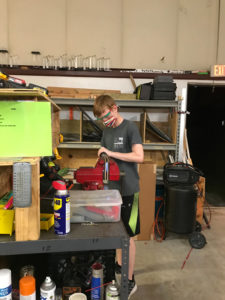
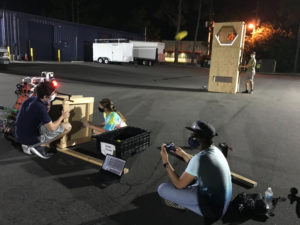 4-H Exploding Bacon Robotics Team 1902 from Orlando, Florida (2019) started in-person meetings August 24th. We meet every Monday and Wednesday 5:00pm-9:00pm and some Saturdays. As a 4-H team, we must comply with their guidelines for capacity and social distancing and must provide a written request for the days we want to meet. Our students created a proposal for COVID-19 Safety Measures that was submitted to 4-H and approved. The proposal follows the guidance developed by Florida 4-H, which is based on the Centers for Disease Control and Prevention (CDC) and University of Florida Guidelines for COVID-19. It addresses:
4-H Exploding Bacon Robotics Team 1902 from Orlando, Florida (2019) started in-person meetings August 24th. We meet every Monday and Wednesday 5:00pm-9:00pm and some Saturdays. As a 4-H team, we must comply with their guidelines for capacity and social distancing and must provide a written request for the days we want to meet. Our students created a proposal for COVID-19 Safety Measures that was submitted to 4-H and approved. The proposal follows the guidance developed by Florida 4-H, which is based on the Centers for Disease Control and Prevention (CDC) and University of Florida Guidelines for COVID-19. It addresses:
- Ensuring sick students and mentors stay home and prompt identification and isolation of sick persons
- Social distancing – team members must be at least six-feet apart and our current capacity limit is 10 people per meeting (2 mentors & 8 students)
- Team member hygiene and source controls
- Workplace cleaning and disinfection protocol
- Drop-off, pick-up, and delivery practices and protocols
- Communication and training protocol
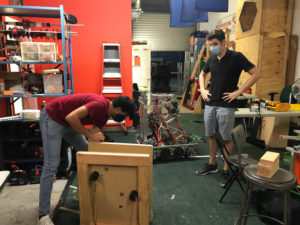 We have shared the proposal with other teams in Florida to help them get approval for in person meetings and would be happy to share with anyone interested. Send an email request to baconfrclead@gmail.com if you would like a copy. In order to accommodate all of our students, we had them fill out an availability survey and we do a schedule every week ensuring proper distribution of veterans and new students as well as electrical and mechanical students. We have weekly virtual CAD training and monthly virtual business meetings. In order to keep communication open and coordinate the work that needs to be done, we have a google doc that everyone has access to that documents what work needs to be done each night and we provide updates after every meeting.
We have shared the proposal with other teams in Florida to help them get approval for in person meetings and would be happy to share with anyone interested. Send an email request to baconfrclead@gmail.com if you would like a copy. In order to accommodate all of our students, we had them fill out an availability survey and we do a schedule every week ensuring proper distribution of veterans and new students as well as electrical and mechanical students. We have weekly virtual CAD training and monthly virtual business meetings. In order to keep communication open and coordinate the work that needs to be done, we have a google doc that everyone has access to that documents what work needs to be done each night and we provide updates after every meeting.
Overall, this has been very effective. The students are very happy to be back in the build space. Several prototypes have been designed and built and new students are getting trained on the machines. In addition, more students are getting involved in the virtual outreaches and presentations that our team has been doing during the pandemic.
Team 2834
In person, small group meetings and added Discord
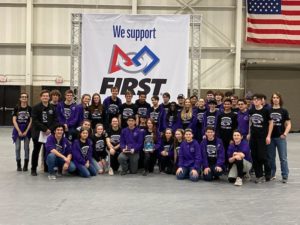 Like many teams, the Bionic Black Hawks Team 2834 from Bloomfield Hills, Michigan (2018) traditionally are active year-round, with our off-season programs such as camps and outreach being major factors to our success. With the COVID related shutdowns and the ongoing uncertainties of trying to meet in person, our entire program for grades K-12 was put on hold through the summer while we planned how to approach the Fall seasons for FLL (Explore and Challenge), and FTC. We held informational meetings offline, but decided not to attempt in-person or offline camps, which really affected us.
Like many teams, the Bionic Black Hawks Team 2834 from Bloomfield Hills, Michigan (2018) traditionally are active year-round, with our off-season programs such as camps and outreach being major factors to our success. With the COVID related shutdowns and the ongoing uncertainties of trying to meet in person, our entire program for grades K-12 was put on hold through the summer while we planned how to approach the Fall seasons for FLL (Explore and Challenge), and FTC. We held informational meetings offline, but decided not to attempt in-person or offline camps, which really affected us.
One approach we did take for FLL was to create smaller teams, a few of which are literally within one household. Kits and tables were distributed, and offline help is available for the coaches (who are the students parents). Regardless if there are in-person competitions or not, we can apply our camp curriculum for students to learn the concepts. They can still see their success!
The high school team 2834 will annually host a very exciting off-season event in the Fall, the Bloomfield Girls Robotics Competition, where only girls can work on or operate the robots. This would have been our 8th year, but school and FIRST guidelines prevented us from hosting this year. Instead, with help from the FIRST community we created an off-line event that was very much in the spirit of the event to promote girls growth in STEM. Included were a panel discussion from some very accomplished local career women in STEM, and a second panel of recent female FIRST alums to speak how they are applying their FIRST experience in college. This might be something that teams can consider to do for themselves in their own local regions.
As of right now, in accordance with our local guidelines, team 2834 is able to meet in small groups face to face. We are using this time to prototype sub-systems for the next season and look for improvements to last year’s robot. We have 12 new freshman students, about average for us, and have been following our normal approach during the Fall to have new students spend time learning each of the main functional areas of the team. The students initiated a new team communication platform on Discord, which is an improvement over our existing process, especially considering the need to have robust offline communication during these times.
Team 1816
Limited Pod groups, cleaning protocols, Slack and full team Zoom meetings
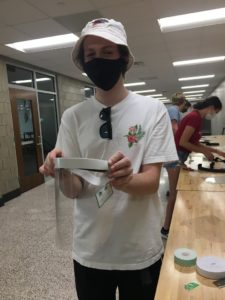
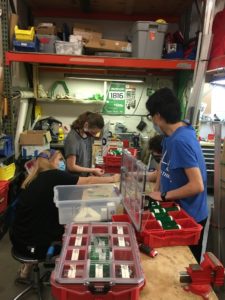 During the COVID-19 pandemic, FIRST Team 1816 “The Green Machine”’s (2019) number one priority is safety. Our team from Edina, Minnesota team addressed this by outlining a plan which took into account personal protection measures and facility cleaning processes. Within this plan, we initiated pods which consist of 5-7 team members and 1-2 mentors. This allows us to meet in person to complete specific tasks in small contained groups.
During the COVID-19 pandemic, FIRST Team 1816 “The Green Machine”’s (2019) number one priority is safety. Our team from Edina, Minnesota team addressed this by outlining a plan which took into account personal protection measures and facility cleaning processes. Within this plan, we initiated pods which consist of 5-7 team members and 1-2 mentors. This allows us to meet in person to complete specific tasks in small contained groups.
To also engage students who cannot meet in person, we started our weekly Monday online all team meetings in mid-September 2020. This guarantees that all team members and mentors can participate and see each other at least one time, weekly. This is a huge change for us as a team, being accustomed to meeting as often as three times weekly during the ‘off-season.’ Team leaders monitor current community conditions, often reference the FRC document on safe COVID practices, and will pivot as needed throughout the year.
We have discovered an even greater need for connection with our FIRST community during this time of socially distanced activities. 1816 is addressing this within our team by adjusting our annual Team retreat to a combination of online activities and a socially distanced outdoor activity. This allowed us to welcome new Team members, build a strong team culture, and promote our Team Core Values. For regular daily communication, we continue to use our team Slack account to keep students and mentors up to date.
Another way our team is staying connected is by keeping up good communications with our sponsors. We have taken time to reach out to our sponsors to explain our continuous efforts and work as a team during the pandemic. We’ve also made efforts to stay connected with our community with a virtual Q & A with FRC Team 8416, Ely, MN; seeking out FRC ‘experts’ to join our Zoom meetings on specific topics of interest, as well as a Leadership Boot Camp, designed specifically to be done virtually with FRC teams based in St. Paul, MN. These events go to show that virtual outreach can close a gap in a socially distanced world.
Team 175
Online communications only, Weekly Zoom meetings and individual projects
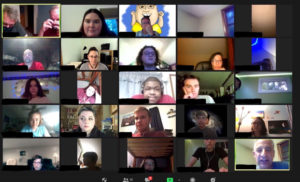 Following our school guidelines, Buzz Robotics Team 175 from Enfield, Connecticut (2002) is currency meeting only virtually. We started virtual meetings on September 9, 2020, and have been continuing to do so throughout the past weeks. The team usually meets in person every Wednesday from 6-9pm during pre-season to train our new students and get in the swing of things, so the announcement that we would no longer be able to do so was definitely a shock to a large portion of our participants considering we had never even thought about having to do it online before. However, we have taken it in stride and have not given up on the season, opting to do weekly meetings over Zoom to stay in touch and practice our skills for multiple subgroups. Our work dynamic has changed immensely, considering most of our subgroups functioned by meeting in person and working on physical projects, but as the team is learning new ways we are still bettering our skills and learning more for when we go back.
Following our school guidelines, Buzz Robotics Team 175 from Enfield, Connecticut (2002) is currency meeting only virtually. We started virtual meetings on September 9, 2020, and have been continuing to do so throughout the past weeks. The team usually meets in person every Wednesday from 6-9pm during pre-season to train our new students and get in the swing of things, so the announcement that we would no longer be able to do so was definitely a shock to a large portion of our participants considering we had never even thought about having to do it online before. However, we have taken it in stride and have not given up on the season, opting to do weekly meetings over Zoom to stay in touch and practice our skills for multiple subgroups. Our work dynamic has changed immensely, considering most of our subgroups functioned by meeting in person and working on physical projects, but as the team is learning new ways we are still bettering our skills and learning more for when we go back.
As of now, we meet every Wednesday evening from 6:30-8:30pm to have a team discussion then split into our various subgroups, such as CAD, Electrical, Safety, Social Media/Newsletter, Chairman’s Award Presentation, and Woodie Flowers Award. Our school is using a hybrid model, which means that all of our students are working online for at least 3 days a week, so we have prioritized keeping our meetings shorter to reduce Zoom fatigue. To make up some time, students have also been working on their own time, whether it be to CAD out a new model, give thought to ideas and plan out what we are to discuss next meeting, writing articles, compiling research, making art and pages to go on our social media, or learning new software to practice new skills. This gives students the choice to work at their assigned work at their own pace, and makes meetings easier when there are no hard deadlines.
In conclusion, switching our meetings to entirely online has been a much bigger challenge than any of our participants expected, but overall we have had a great outcome and are thankful that we get to stay in touch with our teammates and still be productive. One huge thing that has helped us with our season so far has been to make our meetings dynamic, with a variety of activities at each meeting, checking up on each other personally to see how everyone’s doing and allowing conversation between students and mentors since many have not been able to communicate since March. We are still figuring out how to maximize our time and continuing to brainstorm how we can complete virtual outreach, recruiting, and fundraising, but our biggest tips to any other teams that are meeting online or have to transfer to online meetings only is to make meetings interactive, assign work directly to increase productivity, and allow leeway for participants since most students are already online for most of the day. Overall, we are so proud of our progress and we wish a great season to all other teams.
Have questions? Reach out to us at FIRSTHallofFame@gmail.com
